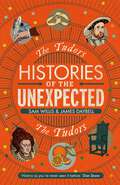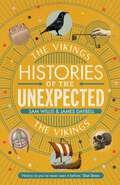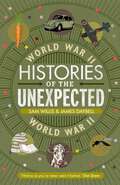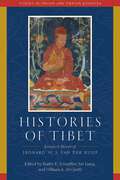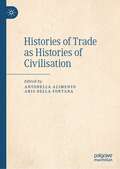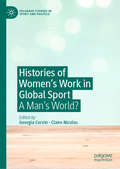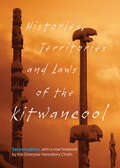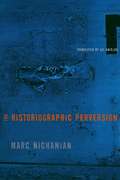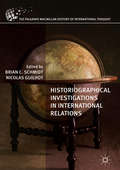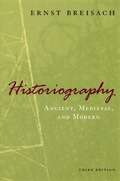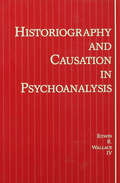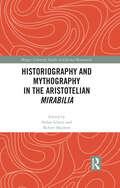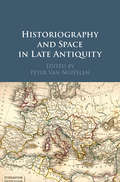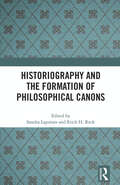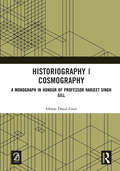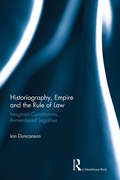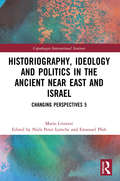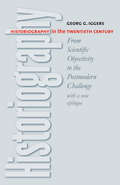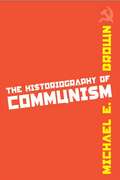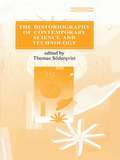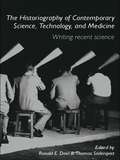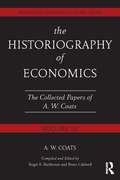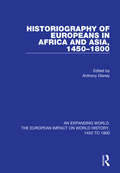- Table View
- List View
Histories of the Unexpected: The Tudors (Histories of the Unexpected)
by James Daybell Sam WillisThe Histories of the Unexpected series not only presents a new way of thinking about the past, but also reveals the world around us as never before. Traditionally, the Tudors have been understood in a straightforward way but the period really comes alive if you take an unexpected approach to its history. Yes, Tudor monarchs, exploration and religion have a fascinating history . . . but so too do cannibalism, shrinking, bells, hats, mirrors, monsters, faces, letter-writing and accidents! Each of these subjects is equally fascinating in its own right, and each sheds new light on the traditional subjects and themes that we think we know so well.
Histories of the Unexpected: The Vikings (Histories of the Unexpected)
by Sam Willis James DaybellThe Histories of the Unexpected series not only presents a new way of thinking about the past, but also reveals the world around us as never before. Traditionally, the Vikings have been understood in a straightforward way—but the period really comes alive if you take an unexpected approach to its history. Yes, ships, raiding and trade have a fascinating history, but so too do hair, break-ins, toys, teeth, mischief, luck and silk! Each of these subjects is equally fascinating in its own right, and each sheds new light on the traditional subjects and themes that we think we know so well.
Histories of the Unexpected: World War II (Histories of the Unexpected)
by James Daybell Sam WillisThe Histories of the Unexpected series not only presents a new way of thinking about the past, but also reveals the world around us as never before. Traditionally, World War II has been understood in a straightforward way but the period really comes alive if you take an unexpected approach to its history. Yes, battles, bombs and bravery all have a fascinating history . . . but so too do handkerchiefs, furniture, Mozart, insects, blood, mothers, suicide, darkness, cancer and puppets! Each of these subjects is equally fascinating in its own right, and each sheds new light on the traditional subjects and themes that we think we know so well.
Histories of Tibet: Essays in Honor of Leonard W. J. van der Kuijp
by Kurtis R. Schaeffer, Jue Liang, and William A. McGrathThe thirty-four essays in this volume follow the particular interests of Leonard van der Kuijp, whose groundbreaking research in Tibetan intellectual and cultural history imbued his students with an abiding sense of curiosity and discovery.As part of Leonard van der Kuijp&’s research in Tibetan history, as he patiently and expertly revealed treasures of the Tibetan intellectual tradition in fourteenth-century Tsang, or seventeenth-century Lhasa, or eighteenth-century Amdo, he developed an international community of colleagues and students. The thirty-four essays in this volume follow the particular interests of the honoree and express the comprehensive research that his international cohort have engaged in alongside his generous tutelage over the course of forty years. He imbued his students with the abiding sense of curiosity and discovery that can be experienced through every one of his writings, and that can be found as well in these new essays in intellectual, cultural, and institutional history by Christopher Beckwith, the late Hubert Decleer, Franz-Karl Ehrhard, Jörg Heimbel and David Jackson, Isabelle Henrion-Dourcy, Nathan Hill, Matthew Kapstein, Kurtis Schaeffer, Michael Witzel, Allison Aitken, Yael Bentor, Pieter Verhagen, Todd Lewis, William McGrath, Peter Schwieger, Gray Tuttle, and others.
Histories of Trade as Histories of Civilisation
by Antonella Alimento Aris Della FontanaThis edited collection explores the histories of trade, a peculiar literary genre that emerged in the context of the historiographical and cultural changes promoted by the histoire philosophique movement. It marked a discontinuity with erudition and antiquarianism, and interacted critically with universal history. By comparing and linking the histories of individual peoples within a common historical process, this genre enriched the reflection on civilisation that emerged during the long eighteenth century. Those who looked to the past wanted to understand the political constitutions and manners most appropriate to commerce, and grasp the recurring mechanisms underlying economic development. In this sense, histories of trade constituted a declination of eighteenth-century political economy, and thus became an invaluable analytical and practical tool for a galaxy of academic scholars, journalists, lawyers, administrators, diplomats and government ministers whose ambition was to reform the political, social and economic structure of their nations. Moreover, thanks to these investigations, a lucid awareness of historical temporality and, more particularly, the irrepressible precariousness of economic hegemonies, developed. However, as a field of tension in which multiple and even divergent intellectual sensibilities met, this literary genre also found space for critical assessments that focused on the ambivalence and dangers of commercial civilisation. Examining the complex relationship between the production of wealth and civilisation, this book provides unique insights for scholars of political economy, intellectual history and economic history.
Histories of Women's Work in Global Sport: A Man’s World? (Palgrave Studies in Sport and Politics)
by Georgia Cervin Claire NicolasSport has never been a man’s world. As this volume shows, women have served key roles not only as athletes and spectators, but as administrators, workers, decision-makers, and leaders in sporting organizations around the world. Contributors excavate scarce archival material to uncover histories of women’s work in sport, from swimming teachers in nineteenth-century England to national sports administrators in twentieth-century Côte d’Ivoire, and many places in between. Their work has been varied, holding roles as teachers, wives, and secretaries in sporting contexts around the world, often with diplomatic functions—including at the 1968 and 1992 Olympic Games. Finally, this collection shows how gender initiatives have developed in sporting institutions in Europe and international sport federations today. With a foreword by Grégory Quin and afterword by Anaïs Bohuon, this is a pioneering study into gender and women’s work in global sport.
Histories, Territories and Laws of the Kitwancool: Second Edition, with a New Foreword by the Gitanyow Hereditary Chiefs
by Maggie Good B. W. McKilvington Peter Williams Walter Derrick Solomon Good Walter Douse Ernest Smith Fred GoodA new edition of the groundbreaking 1958 publication created in collaboration with the Gitanyow Hereditary Chiefs.This beautiful new edition of the histories and laws of the Gitanyow (literally “people of the small/narrow place,” once called the Kitwancool in settler accounts), as recounted to museum curator Wilson Duff in 1958, includes a new foreword by Gitanyow Hereditary Chiefs while preserving the original text. Until the mid-twentieth century, the village of Kitwancool (now Gitanyow) was only accessible to outsiders by trail. This inaccessibility of territory protected a deeply independent spirit and unique legal system, recorded here as part of an agreement that allowed for the removal of Gitanyow totem poles to the Royal BC Museum for preservation. The complete histories of the Gitanyow, told in their own words, were also translated and recorded here as part of the same agreement.This publication not only captures the histories, territories and laws of the Gitanyow, but also a significant moment in time for settler-Indigenous relations, and the origin story for totem poles still standing at the Royal BC Museum today.Histories, Territories and Laws of the Kitwancool is a must-read for anyone who wants to understand Gitanyow society and belief.
The Historiographic Perversion
by Gil Anidjar Marc NichanianGenocide is a matter of law. It is also a matter of history. Engaging some of the most disturbing responses to the Armenian genocide, Marc Nichanian strikingly reveals the complex role played by law and history in making this and other genocides endure as contentious events. Nichanian's book argues that both law and history fail to contend with the very nature of events for which there is no archive (no documents, no witnesses). Both history and law fail to address the modern reality that events can be-and are now being-perpetrated that depend upon the destruction of the archive, turning monstrous deeds into nonevents. Genocide, this book makes us see, is in one sense the destruction of the archive. It relies on the historiographic perversion.
The Historiographic Perversion
by Marc NichanianGenocide is a matter of law. It is also a matter of history. Engaging some of the most disturbing responses to the Armenian genocide, Marc Nichanian strikingly reveals the complex role played by law and history in making this and other genocides endure as contentious events.Nichanian's book argues that both law and history fail to contend with the very nature of events for which there is no archive (no documents, no witnesses). Both history and law fail to address the modern reality that events can be-and are now being-perpetrated that depend upon the destruction of the archive, turning monstrous deeds into nonevents. Genocide, this book makes us see, is in one sense the destruction of the archive. It relies on the historiographic perversion.
Historiographical Investigations in International Relations (The Palgrave Macmillan History of International Thought)
by Brian C. Schmidt Nicolas GuilhotThis book critically investigates the historiography of International Relations. For the past fifteen years, the field has witnessed the development of a strong interest in the history of the discipline. The chapters in this edited volume, written by some of the field’s preeminent disciplinary historians, all manifest the best of an innovative and exciting generation of scholarship on the history of the discipline of International Relations. One of the objectives of this volume is to take stock of the historical turn. Yet this volume is not simply a stock-taking exercise, as it also intends to identify the limitations and blind spots of the recent historiographical literature. The chapters consider a range of diverse thinkers and examine their impact on understanding various dimensions of the field’s history.
Historiography: Ancient, Medieval, and Modern
by Ernst BreisachIn this pioneering work, Ernst Breisach presents an effective, well-organized, and concise account of the development of historiography in Western culture. Neither a handbook nor an encyclopedia, this up-to-date third edition narrates and interprets the development of historiography from its origins in Greek poetry to the present, with compelling sections on postmodernism, deconstructionism, African-American history, women's history, microhistory, the Historikerstreit, cultural history, and more. The definitive look at the writing of history by a historian, Historiography provides key insights into some of the most important issues, debates and innovations in modern historiography.
Historiography: Ancient, Medieval, and Modern
by Ernst BreisachIn this pioneering work, Ernst Breisach presents an effective, well-organized, and concise account of the development of historiography in Western culture. Neither a handbook nor an encyclopedia, this up-to-date third edition narrates and interprets the development of historiography from its origins in Greek poetry to the present, with compelling sections on postmodernism, deconstructionism, African-American history, women’s history, microhistory, the Historikerstreit, cultural history, and more. The definitive look at the writing of history by a historian, Historiography provides key insights into some of the most important issues, debates and innovations in modern historiography. Praise for the first edition: “Breisach’s comprehensive coverage of the subject and his clear presentation of the issues and the complexity of an evolving discipline easily make his work the best of its kind.”—Lester D. Stephens, American Historical Review
Historiography and Causation in Psychoanalysis
by Edwin R. Wallace, IVWhat do the psychoanalyst and the historian have in common? This important question has stimulated a lively debate within the psychoanalytic profession in recent years, bearing as it does on the very nature of the psychoanalytic enterprise. Edwin Wallace, a clinician with training in the history and philosophy of science, brings a ranging scholarly perspective to the debate, mediating between rival perspectives and clarifying the issues at stake in the process of offering his own thoughtful conception of the historical nature of psychoanalysis. For Wallace, the procedures, problems, and interpretive possibilities of psychoanalysis and history are strikingly constant and mutually illuminating. He insists, further, that the fundamentally historical nature of psychoanalysis poses no threat to its scientific dignity. In arriving at this verdict, Wallace pushes beyond his expansive treatment of the many parallels between history and psychoanalysis to a systematic consideration of the problem of causation in both disciplines. Tracing the historical background of causation in science, philosophy, history, and analysis, he offers a logical analysis of determinism and a critique of causal language in psychoanalysis while adumbrating the historical character of psychoanalytic explanation. Historiography and Causation in Psychoanalysis is a thought-provoking work that cuts across disciplinary boundaries. It will cultivate the historical sensibilities of all its clinical readers, broadening and deepening the intellectual perspective they bring to the dialogue about the nature of psychoanalytic work. Timely and rewarding reading for analysts, psychiatrists, and clinical psychologists, it will be welcomed by historians and philosophers as well.
Historiography and Mythography in the Aristotelian Mirabilia (Rutgers University Studies in Classical Humanities)
by Stefan Schorn Robert MayhewThis is the first full-length volume in English that focuses on the historiographical section of the Mirabilia or De mirabilibus auscultationibus (On Marvelous Things Heard), attributed to Aristotle but not in fact by him. The central section of the Mirabilia, namely §§ 78–151, for the most part deals with historiographical material, with many of its entries having some relationship to ancient Greek historians of the 4th and 3rd centuries BC. The chapters in this volume discuss various aspects of this portion of the text, including textual issues involving toponyms; possible structural principles behind the organization of this section; the passages on Theopompus and Timaeus; mythography; the philosopher Heracleides of Pontos; Homeric exegesis; and the interrelationship between pseudo-Plutarch’s On Rivers, a section of the historian Stobaeus’ Geography, and the Mirabilia. Historiography and Mythography in the Aristotelian Mirabilia is an invaluable resource for scholars and students of this text, and of Greek philosophy, historiography, and literature more broadly.
Historiography and Space in Late Antiquity
by Peter Van NuffelenThe Roman Empire traditionally presented itself as the centre of the world, a view sustained by ancient education and conveyed in imperial literature. Historiography in particular tended to be written from an empire-centred perspective. In Late Antiquity, however, that attitude was challenged by the fragmentation of the empire. This book explores how a post-imperial representation of space emerges in the historiography of that period. Minds adapted slowly, long ignoring Constantinople as the new capital and still finding counter-worlds at the edges of the world. Even in Christian literature, often thought of as introducing a new conception of space, the empire continued to influence geographies. Political changes and theological ideas, however, helped to imagine a transferral of empire away from Rome and to substitute ecclesiastical for imperial space. By the end of Late Antiquity, Rome was just one of many centres of the world.
Historiography and the Formation of Philosophical Canons
by Sandra Lapointe Erich H. ReckThis book presents a series of case studies and reflections on the historiographical assumptions, methods and approaches that shape the way in which philosophers construct their own past. The chapters in the volume advance discussion of the methods of historians of philosophy, while at the same time illustrating the various ways in which philosophical canons come into existence, debunking the myth of analytical philosophy’s ahistoricism and providing a deeper understanding of the roles historiographical devices play in philosophical thought. More importantly, the contributors attempt to understand history of philosophy in connection with other historical and historiographical approaches: contributors engage classical history of science, sociology of knowledge, history of psychology and historiography, in dialogue with historiographical practices in philosophy more narrowly construed. Additionally, select chapters adopt a more diverse perspective, by making place for non-Western approaches and for efforts to construe new philosophical narratives that do justice to the voice of women across the centuries. Historiography and the Formation of Philosophical Canons will be of interest to researchers and advanced students working in history of philosophy, meta-philosophy, philosophy of history, historiography, intellectual history and sociology of knowledge.
Historiography | Cosmography: A Monograph in Honour of Professor Harjeet Singh Gill
by Ishwar Dayal GaurThis book attempts to study Panjab historiography from the viewpoint of cosmography, the concept derived from the cosmological paradigm which Professor Harjeet Singh Gill, an eminent semiotician, developed in his oeuvre. Since its introduction in the colonial Panjab, the discipline of historiography subdued the indigenous craft of history writing such as katha, qissa, janamsakhi, and jangnama wherein what Professor Gill has conceptualized as “the dialectic of representation and transcendence” remained ever active. This title has been co-published with Aakar Books. Print editions not for sale in South Asia (India, Sri Lanka, Nepal, Bangladesh, Pakistan and Bhutan)
Historiography, Empire and the Rule of Law: Imagined Constitutions, Remembered Legalities
by Ian DuncansonHistoriography, Empire and the Rule of Law considers the intersection of these terms in the historical development of what has come to be known as the ‘rule of law’. The separation of governmental powers, checks and balances, and judicial independence signified something entirely new in the way in which politics was imagined and practiced. This ‘rule of law’ cannot, as it often is, be traced to the justification and practice of government as originating in a social contract among the governed; but rather, by analogy with a popular conveyancing innovation of the era, to the trust – a device by which the power of ownership of land could be restrained. But how could the restraint of power remain consistent with the avoidance of anarchic disagreement among those granted the task of supervision and restraint? In response, it is argued here, the central legal and political task became one of managing disagreement and change peacefully and constructively – by drawing on a colonial tradition that emphasised civility, negotiation and compromise. And the study of all of these qualities as they evolved, Ian Duncanson contends, is vital to understanding the emergence of the ‘rule of law’. Historiography, Empire and the Rule of Law will be invaluable for all those engaged in research and the postgraduate study of socio-legal and constitutional studies, and early modern and modern history.
Historiography, Ideology and Politics in the Ancient Near East and Israel: Changing Perspectives 5
by Mario LiveraniIn this volume, Niels Peter Lemche and Emanuel Pfoh present an anthology of seminal studies by Mario Liverani, a foremost scholar of the Ancient Near East. This collection contains 18 essays, 11 of which have originally been published in Italian and are now published in English for the first time. It represents an important contribution to Ancient Near Eastern and Biblical Studies, exposing the innovative interpretations of Liverani on many historical and ideological aspects of ancient society. Topics range from the Amarna letters and the Ugaritic epic, to the ‘origins’ of Israel. Historiography, Ideology and Politics in the Ancient Near East and Israel will be an invaluable resource for Ancient Near Eastern and Biblical scholars, as well as graduate and post-graduate students.
Historiography in the Twentieth Century: From Scientific Objectivity to the Postmodern Challenge
by Georg G. IggersIn this book, now published in 10 languages, a preeminent intellectual historian examines the profound changes in ideas about the nature of history and historiography. Georg G. Iggers traces the basic assumptions upon which historical research and writing have been based, and describes how the newly emerging social sciences transformed historiography following World War II. The discipline's greatest challenge may have come in the last two decades, when postmodern ideas forced a reevaluation of the relationship of historians to their subject and questioned the very possibility of objective history. Iggers sees the contemporary discipline as a hybrid, moving away from a classical, macrohistorical approach toward microhistory, cultural history, and the history of everyday life. The new epilogue, by the author, examines the movement away from postmodernism towards new social science approaches that give greater attention to cultural factors and to the problems of globalization.
The Historiography of Communism
by Michael E. BrownIn this fresh appraisal of communism and anti-communism, with an emphasis on the American case, respected scholar Michael E. Brown examines the methods, controversies and difficulties involved in writing the history of communism. Arguing that one important way of understanding communism--other than as a concrete political or ideological force--is as an expression of an essentially reflexive aspect of society that typically manifests itself in social movements. In this regard, Brown understands the history of communism as part of the history of society. Examining works by E. P. Thompson, Karl Marx, and Pierre Clastres, Brown develops the idea of history as an immanent feature of human activities. Taken together, the essays in this book--written over a period of 20 years-offer a distinctive approach to the connections between social theory, criticism, and historiography and to what is "social" about "social movements. "
The Historiography of Contemporary Science and Technology (Routledge Studies in the History of Science, Technology and Medicine)
by Thomas SöderqvistMore than ninety percent of all scientific history has been made during the last half century. So far, however, only a fraction of historical scholarship has dealt with this period. Merely a decade ago, most scientific historians considered recent science - the scientific culture created, lived and remembered by contemporary scientists - an area of study best left to the historical actors themselves.
The Historiography of Contemporary Science, Technology, and Medicine: Writing Recent Science (Routledge Studies in the History of Science, Technology and Medicine #Vol. 23)
by Ronald E. Doel Thomas SöderqvistAs historians of science increasingly turn to work on recent (post 1945) science, the historiographical and methodological problems associated with the history of contemporary science are debated with growing frequency and urgency. Bringing together authorities on the history, historiography and methodology of recent and contemporary science, this book reviews the problems facing historians of technology, contemporary science and medicine, and explores new ways forward. With contributions from key researchers in the field, the text covers topics that will be of ever increasing interest to historians of post-war science, including the difficulties of accessing and using secret archival material, the interactions between archivists, historians and scientists, and the politics of evidence and historical accounts.
The Historiography of Economics: British and American Economic Essays, Volume III (British and American Economic Essays)
by A.W. Bob CoatsThis is the third and final volume of collected papers of A.W. Bob Coats. Coats began to collect material for this volume in the years following the publication of the second volume in 1993, but sadly died in 2007, before the work was completed. The volume has now been completed under the editorship of Roger Backhouse and Bruce Caldwell. Along with his articles, the compilation of the volume also reflects Coats’ interest in and commitment to book reviews, a selection of which have been chosen for inclusion. The book also includes a comprehensive bibliography. In addition to a preface by Backhouse and Caldwell, the volume also reproduces the obituary that was published in History of Political Economy, a memoir published in 1996, and an interview with Grant Fleming, published the previous year. Together, the introductory materials, articles and reviews serve as a fitting tribute to the body of work of Bob Coats.
Historiography of Europeans in Africa and Asia, 1450–1800 (An Expanding World: The European Impact on World History, 1450 to 1800 #4)
by Anthony DisneyThe first part of this volume deals with the changes and continuities in historical approaches over the last fifty years, with three further sections focusing on initial contacts, formal presences, and informal presences. Emphasis has been placed on the major European players in Asia and Africa before 1800 - the Portuguese, Dutch and English, without neglecting the role played by the French, Spanish, Scandinavians and others.
